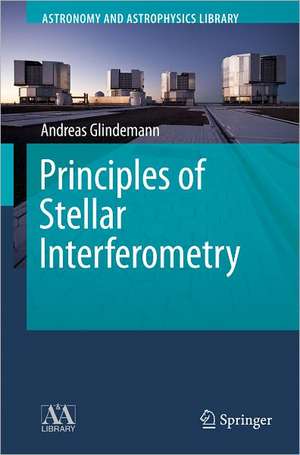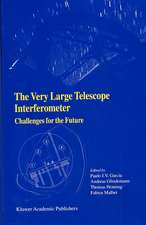Principles of Stellar Interferometry: Astronomy and Astrophysics Library
Autor Andreas Glindemannen Limba Engleză Hardback – 5 ian 2011
This carefully written book is intended to provide a solid understanding of the principles of stellar interferometry to students starting an astronomical research project in this field or to develop instruments and to astronomers using interferometry but who are not interferometrists per se.
Illustrated by excellent drawings and calculated graphs
- the imaging process in stellar interferometers is explained starting from first principles on light propagation and diffraction,
- wave propagation through turbulence is described in detail using Kolmogorov statistics,
- the impact of turbulence on the imaging process is discussed both for single telescopes and for interferometers,
- instrumental techniques like beam combination and array layout are described, and the requirements for delay lines are derived,
- visibility measurements (modulus and phase) through turbulence are analyzed and limitations are quantified,
- correction methods (fringe tracking and adaptive optics) are presented, discussing closed loop operation with a dual feed system.
| Toate formatele și edițiile | Preț | Express |
|---|---|---|
| Paperback (1) | 700.29 lei 43-57 zile | |
| Springer Berlin, Heidelberg – 25 feb 2013 | 700.29 lei 43-57 zile | |
| Hardback (1) | 944.99 lei 43-57 zile | |
| Springer Berlin, Heidelberg – 5 ian 2011 | 944.99 lei 43-57 zile |
Din seria Astronomy and Astrophysics Library
- 17%
 Preț: 496.37 lei
Preț: 496.37 lei - 15%
 Preț: 603.58 lei
Preț: 603.58 lei - 19%
 Preț: 455.24 lei
Preț: 455.24 lei - 17%
 Preț: 525.72 lei
Preț: 525.72 lei - 13%
 Preț: 393.37 lei
Preț: 393.37 lei - 19%
 Preț: 524.14 lei
Preț: 524.14 lei - 17%
 Preț: 393.90 lei
Preț: 393.90 lei - 15%
 Preț: 647.40 lei
Preț: 647.40 lei - 15%
 Preț: 541.54 lei
Preț: 541.54 lei - 17%
 Preț: 362.70 lei
Preț: 362.70 lei - 18%
 Preț: 1006.55 lei
Preț: 1006.55 lei - 18%
 Preț: 745.33 lei
Preț: 745.33 lei - 15%
 Preț: 641.20 lei
Preț: 641.20 lei -
 Preț: 397.38 lei
Preț: 397.38 lei - 15%
 Preț: 598.21 lei
Preț: 598.21 lei - 15%
 Preț: 658.05 lei
Preț: 658.05 lei - 23%
 Preț: 815.07 lei
Preț: 815.07 lei -
 Preț: 409.89 lei
Preț: 409.89 lei - 15%
 Preț: 610.61 lei
Preț: 610.61 lei -
 Preț: 393.90 lei
Preț: 393.90 lei - 15%
 Preț: 655.27 lei
Preț: 655.27 lei - 18%
 Preț: 951.47 lei
Preț: 951.47 lei - 18%
 Preț: 960.42 lei
Preț: 960.42 lei - 18%
 Preț: 1397.68 lei
Preț: 1397.68 lei - 18%
 Preț: 959.98 lei
Preț: 959.98 lei - 18%
 Preț: 1012.08 lei
Preț: 1012.08 lei - 15%
 Preț: 481.03 lei
Preț: 481.03 lei - 15%
 Preț: 672.43 lei
Preț: 672.43 lei -
 Preț: 413.15 lei
Preț: 413.15 lei - 18%
 Preț: 1554.72 lei
Preț: 1554.72 lei - 18%
 Preț: 1410.63 lei
Preț: 1410.63 lei -
 Preț: 390.08 lei
Preț: 390.08 lei - 19%
 Preț: 502.94 lei
Preț: 502.94 lei - 15%
 Preț: 654.12 lei
Preț: 654.12 lei - 24%
 Preț: 851.62 lei
Preț: 851.62 lei - 19%
 Preț: 515.32 lei
Preț: 515.32 lei - 15%
 Preț: 663.14 lei
Preț: 663.14 lei - 15%
 Preț: 656.43 lei
Preț: 656.43 lei - 18%
 Preț: 741.68 lei
Preț: 741.68 lei - 15%
 Preț: 647.40 lei
Preț: 647.40 lei -
 Preț: 388.90 lei
Preț: 388.90 lei - 18%
 Preț: 1223.11 lei
Preț: 1223.11 lei - 15%
 Preț: 651.51 lei
Preț: 651.51 lei - 15%
 Preț: 655.27 lei
Preț: 655.27 lei -
 Preț: 347.59 lei
Preț: 347.59 lei - 18%
 Preț: 794.39 lei
Preț: 794.39 lei
Preț: 944.99 lei
Preț vechi: 1152.43 lei
-18% Nou
Puncte Express: 1417
Preț estimativ în valută:
180.83€ • 189.27$ • 150.50£
180.83€ • 189.27$ • 150.50£
Carte tipărită la comandă
Livrare economică 31 martie-14 aprilie
Preluare comenzi: 021 569.72.76
Specificații
ISBN-13: 9783642150272
ISBN-10: 3642150276
Pagini: 364
Ilustrații: XVIII, 346 p.
Dimensiuni: 155 x 235 x 25 mm
Greutate: 0.43 kg
Ediția:2011
Editura: Springer Berlin, Heidelberg
Colecția Springer
Seria Astronomy and Astrophysics Library
Locul publicării:Berlin, Heidelberg, Germany
ISBN-10: 3642150276
Pagini: 364
Ilustrații: XVIII, 346 p.
Dimensiuni: 155 x 235 x 25 mm
Greutate: 0.43 kg
Ediția:2011
Editura: Springer Berlin, Heidelberg
Colecția Springer
Seria Astronomy and Astrophysics Library
Locul publicării:Berlin, Heidelberg, Germany
Public țintă
GraduateCuprins
1 Propagation of Light.- 2 Imaging Process – Propagation through Optical Systems.- 3 Atmospheric Turbulence.- 4 Instrumental Techniques.- 5 Observing through Atmospheric Turbulence.- 6 Modern Interferometers.- A Appendix.- References.- Index.
Textul de pe ultima copertă
Over the last decade, stellar interferometry has developed from a specialist tool to a mainstream observing technique, attracting scientists whose research benefits from milliarcsecond angular resolution. Stellar interferometry has become part of the astronomer’s toolbox, complementing single-telescope observations by providing unique capabilities that will advance astronomical research.
This carefully written book is intended to provide a solid understanding of the principles of stellar interferometry to students starting an astronomical research project in this field or to develop instruments and to astronomers using interferometry but who are not interferometrists per se.
Illustrated by excellent drawings and calculated graphs
This carefully written book is intended to provide a solid understanding of the principles of stellar interferometry to students starting an astronomical research project in this field or to develop instruments and to astronomers using interferometry but who are not interferometrists per se.
Illustrated by excellent drawings and calculated graphs
- the imaging process in stellar interferometers is explained starting from first principles on light propagation and diffraction
- wave propagation through turbulence is described in detail using Kolmogorov statistics
- the impact of turbulence on the imaging process is discussed both for single telescopes and for interferometers
- instrumental techniques like beam combination and array layout are described, and the requirements for delay lines are derived
- visibility measurements (modulus and phase) through turbulence are analyzed and limitations are quantified
- correction methods (fringe tracking and adaptive optics) are presented, discussing closed loop operation with a dual feed system.
Caracteristici
Enables PhD students and scientist specialised in other fields to start a research project in interferometry Pedagogically and carefully written with detailed explanations Well illustrated with line-drawings, greyscale and colour figures Based on the author's longtime experience in ESO's Very Large Telescope Interferometer team Includes supplementary material: sn.pub/extras



















